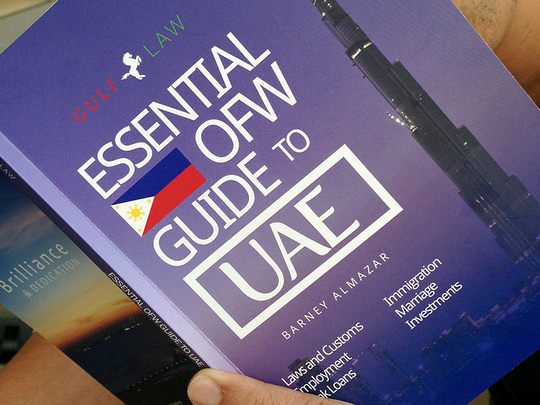
Dubai: Undocumented Filipinos on tourist visas who came to the UAE to work increased by 1,000 per cent from 2011 to 2012 and continue to increase, making them vulnerable to getting into trouble due to lack of preparation for migration.
According to Philippine laws, Filipinos who wish to work abroad need to go through proper channels so they can be documented, protected, and prepared to work abroad through a pre-departure orientation seminar (PDOS). Filipino workers who leave the country on tourist visas are called ‘tourist workers’ and are considered undocumented from the Philippine perspective.
From just 19,760 tourist workers in 2011, the number grew to 207,230 in 2012 based on latest available government figures. It is currently on the upswing, according to Attorney Barney Almazar, director of the commercial department of Gulf Law.
The figures were published in the Essential OFW Guide to UAE launched by Gulf Law and the Philippine Embassy on Friday. The 144-page book contains the dos and don’ts of living in the UAE.
Currently, the UAE is the third top destination of Filipinos around the world, next to the US and Saudi Arabia, at more than 900,000, sixty per cent of whom are professionals.
“We all need to follow the rules of the country so that we are able to maximise migration for development. There’s no use working abroad if you’ll end up in jail because you violated a law [without your knowledge],” Ambassador Grace Princesa said.
“I see the need for this guide book. Filipinos need to know what they’re getting themselves into when they decide to work abroad.”
Almazar said Gulf Law has helped 6,000 Filipinos through their free legal aid seminars since January 2014. Many of the questions that were answered in the book came from the members of the community themselves.
The book is reader-friendly and targets the major issues Filipinos face that are easily summed up in ‘five Is’ — indebtedness, intoxication, immorality or illegal affairs, illegal recruitment, and improper documents.
“The first thing that you have to do when you are in a foreign land is to educate yourself. Know the law because ignorance of the law is not an excuse,” Almazar said.
But this often does not happen as many of the Filipinos who come to the UAE are on tourists visas and are bent on landing a job right away without familiarising themselves with the culture and laws of the land.
Knowing the law then becomes an afterthought, which often comes too late when the person has already landed in jail.
Almazar said Filipinos no longer have an excuse not to obey the UAE’s laws with the new guide book. He said they are planning to issue one book per Filipino. He also said they will incorporate the book’s main contents into the PDOS before Filipinos leave for work abroad.
An app for iPhones and Android devices is in the pipeline so that Filipinos can download the app any time.








